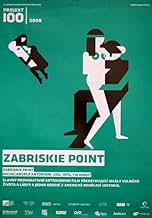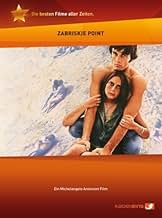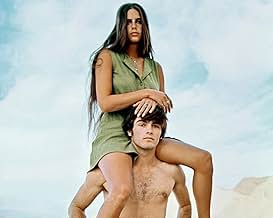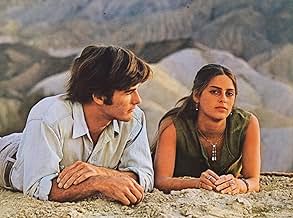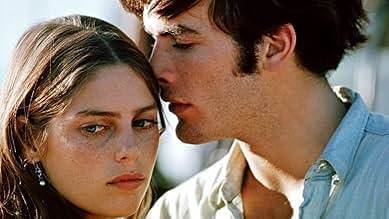Zabriskie Point
- 1h 53m
IMDb RATING
6.9/10
18K
YOUR RATING
At a time of chronic civil unrest in late 1960s America, a young revolutionary suspected of murder steals a plane and meets a girl.At a time of chronic civil unrest in late 1960s America, a young revolutionary suspected of murder steals a plane and meets a girl.At a time of chronic civil unrest in late 1960s America, a young revolutionary suspected of murder steals a plane and meets a girl.
- Awards
- 1 win & 1 nomination total
Martin Abrahams
- Radical student
- (uncredited)
Michael L. Davis
- Police lieutenant on loudspeaker
- (uncredited)
Lee Duncan
- Highway patrolman
- (uncredited)
George Dunn
- Airport mechanic
- (uncredited)
Dennis Falt
- University student
- (uncredited)
Harrison Ford
- Arrested student
- (uncredited)
Jim Goldrup
- College student
- (uncredited)
Norman Grabowski
- Man in Deli
- (uncredited)
Bill Hickman
- Gun store owner
- (uncredited)
- …
Kenner G. Kemp
- Departing Plane Passenger
- (uncredited)
Peter Lake
- Documentary cameraman
- (uncredited)
6.917.9K
1
2
3
4
5
6
7
8
9
10
Featured reviews
A hippie's pretentious odyssey through "decadent", capitalist America.
Antonioni, by making this film, had assumed the role of Papa Smurf to all the little long-haired, American, radical student-Smurfs. He had taken them under the guiding protection of his European communist wings, showing appreciation and support for their confused American ways. (These Smurfs are red and wear blue, not the other way around.) The radical Smurfs were happy to get the guidance of a wise old man with gray hair who regularly preys to the God of all long-haired Smurfs, Lenin the Communist - another wise old man whose beard made the Smurfs take him even more seriously, for it symbolized something wise, though they did not quite know why they regarded the beard to have this kind of deep effect on them. Castro, another wise bearded man, has often profited from this confusion and exuded magical powers with his beard over his naive overseas admirers. (Not to mention Che Guevara: that beard has a certain je-ne-sais-pas-quoi about it, makes one want to immediately embrace Marx and his lovely, pacifistic teachings
) The film starts with a muddled meeting of radically stupid radical students, who engage in dialogues that truly redefine the word "confused". As confused as a blind-folded dog falling of a high-story building into a bottomless pit. Suddenly, the movie's "hero" (well, Antonioni's hero) rises up and says something to his pathetic left-wing peers and then leaves, hoping that this display of "mega-coolness" will improve his James Dean image and vastly increase his chances of getting laid with the best "chicks" in the next mass hippie orgy. Eventually he gets into trouble with cops (i.e. pigs) at a rally, and spends the movie under the blue American capitalist skies, looking for freedom
Or something like that.
Antonioni's predictable assault on capitalism is not only intellectually hollow, but has (or had) nothing new to offer; it's just the same old trigger-happy one-dimensional cops, businessmen discussing business deals (and what's wrong with that, isn't that how Antonioni's movies get made?), and endless shots of TV commercials and billboards advertising the oh-so morally decadent products for the abhorrent, selfish, and greedy right-wing rabble-population who thinks of no one but themselves, their families, their work, and their children.
Papa Smurf Antonioni, just like his long-haired Smurfs and Smurfettes of the late 60s, failed to notice the most obvious and vital aspect about their silly movement: they were allowed to have their laughable meetings and express their anti-establishment opinions freely within that very establishment, whereas the students in those countries whose left-wing systems they admired, did not (and still do not). By far the greatest irony about the hippies - and Antonioni, naturally, failed to realize this as well (his judgment being clouded by cocaine-snorting and an excessive intake of LSD) - is that hippies were (are) the garbage-residue of capitalism. This is an incredible irony. Only in a successfully-functioning capitalist system can you find that species called "hippie"; a spoiled, ungrateful, and selfish bunch of middle and upper-middle class losers.
The film itself seems to go on forever. Antonioni takes his sweet time with getting on with it, while including overlong scenes of pointlessness, with a high dullness factor. His attempts at symbolism are annoying and trite. His statements are highly dubious, at best. This film is Antonioni's way of saying that violent revolution is the solution. And this is what we get from an old, saturated, filthy-rich, fat film-maker who lives in villas and dines in the best French and Italian restaurants.
I don't remember seeing any major Western movie about the Tiananmen massacre of thousands of students in China. But when one Western student gets shot for waving Che Guevara's face into all our faces, we get ten major films about it at once. I suppose this means that a Chinese life is worth a thousand times less than a Western one at least to the left-wing hypocrites who infest movies.
If you're a Marxist neo-hippy and disliked this awful review, please klick "NO" below.
Antonioni's predictable assault on capitalism is not only intellectually hollow, but has (or had) nothing new to offer; it's just the same old trigger-happy one-dimensional cops, businessmen discussing business deals (and what's wrong with that, isn't that how Antonioni's movies get made?), and endless shots of TV commercials and billboards advertising the oh-so morally decadent products for the abhorrent, selfish, and greedy right-wing rabble-population who thinks of no one but themselves, their families, their work, and their children.
Papa Smurf Antonioni, just like his long-haired Smurfs and Smurfettes of the late 60s, failed to notice the most obvious and vital aspect about their silly movement: they were allowed to have their laughable meetings and express their anti-establishment opinions freely within that very establishment, whereas the students in those countries whose left-wing systems they admired, did not (and still do not). By far the greatest irony about the hippies - and Antonioni, naturally, failed to realize this as well (his judgment being clouded by cocaine-snorting and an excessive intake of LSD) - is that hippies were (are) the garbage-residue of capitalism. This is an incredible irony. Only in a successfully-functioning capitalist system can you find that species called "hippie"; a spoiled, ungrateful, and selfish bunch of middle and upper-middle class losers.
The film itself seems to go on forever. Antonioni takes his sweet time with getting on with it, while including overlong scenes of pointlessness, with a high dullness factor. His attempts at symbolism are annoying and trite. His statements are highly dubious, at best. This film is Antonioni's way of saying that violent revolution is the solution. And this is what we get from an old, saturated, filthy-rich, fat film-maker who lives in villas and dines in the best French and Italian restaurants.
I don't remember seeing any major Western movie about the Tiananmen massacre of thousands of students in China. But when one Western student gets shot for waving Che Guevara's face into all our faces, we get ten major films about it at once. I suppose this means that a Chinese life is worth a thousand times less than a Western one at least to the left-wing hypocrites who infest movies.
If you're a Marxist neo-hippy and disliked this awful review, please klick "NO" below.
Beautifully misunderstood...
Antonioni really showed some 'cojones' when he had this movie made. He went to America working under a contract from the most lavish studio (MGM) and he made the most damning portrait of American society i've ever seen. Having seen LA first hand this is the most accurate portrayal of the crowded, overheated and impersonal city. If only Antonioni had met Bill Hicks...
The subsequent burial by the studio is understandable, after such a whopping investment and dismal return. It is sad that people don't get to see this film any more as i believe Antonioni has been proved right. Here he predicts the end of the hippie/civil rights movement in the politics of America. Everyone is much more interested in what goes into their pockets and the relentless expansion of living space into the inhospitable (yet beautiful) desert and beyond. How i would love to see interest in this film re-kindled and a lavish DVD release.
I beseech people to watch Zabriskie Point with an open mind and an open heart. We have a genuinely unique film commenting on a turning point in the history of the most powerful nation on the planet, and we have forgotten about it.
An unexpected gem.
The subsequent burial by the studio is understandable, after such a whopping investment and dismal return. It is sad that people don't get to see this film any more as i believe Antonioni has been proved right. Here he predicts the end of the hippie/civil rights movement in the politics of America. Everyone is much more interested in what goes into their pockets and the relentless expansion of living space into the inhospitable (yet beautiful) desert and beyond. How i would love to see interest in this film re-kindled and a lavish DVD release.
I beseech people to watch Zabriskie Point with an open mind and an open heart. We have a genuinely unique film commenting on a turning point in the history of the most powerful nation on the planet, and we have forgotten about it.
An unexpected gem.
Thirty two years has put in place a focus the film never had in 1970
At the time of its release, ZABRISKE POINT caused great division in film-going circles. A "wannabe classic but artless piece of empty canvas" was the view of the establishment, most critics included. To the alternative movement...a "revelation of everything that is wrong in the world today (1970)" Not too much has changed judging by the comments here, although an overall user-rating of an almost respectable 6.2 suggests an increase in the appreciation factor.
Poor old Mark Frechette and Daria Halpin as the star crossed lovers - definitely in the wrong place at the wrong time (weren't they EVERY wronged and downtrodden teenager of the period???) copped most of the flack, totally unreasonably. They were SUPPOSED to be Mr and Miss typical troubled youth, not Rhett Butler and Scarlett O'Hara on a bender! This was an image-driven film and many flag waving americans were incensed that Italy's outre director Antonioni was given free rein to portray the angst of American youth.
Cinematically, the film was awesome. In London at the time, I saw it on its release and thought that from an objective viewpoint it was quite brilliant (admittedly, I was only 24 myself). Many have commented on its alleged self-indulgence. Yeah, well it WAS Antonioni's film - surely he was free to express his art-form in whatever way he saw fit at the time? The desert scenes have not been topped by any film since.
ZABRISKIE POINT may be shy of "masterpiece" status (mind you, who amongst is solely qualified to make THAT call?) but it is probably now, THE defining film of 70's culture. A time when acid trips, communal living, even just plain old fashioned "love" were not that easy a choice to live with!
Poor old Mark Frechette and Daria Halpin as the star crossed lovers - definitely in the wrong place at the wrong time (weren't they EVERY wronged and downtrodden teenager of the period???) copped most of the flack, totally unreasonably. They were SUPPOSED to be Mr and Miss typical troubled youth, not Rhett Butler and Scarlett O'Hara on a bender! This was an image-driven film and many flag waving americans were incensed that Italy's outre director Antonioni was given free rein to portray the angst of American youth.
Cinematically, the film was awesome. In London at the time, I saw it on its release and thought that from an objective viewpoint it was quite brilliant (admittedly, I was only 24 myself). Many have commented on its alleged self-indulgence. Yeah, well it WAS Antonioni's film - surely he was free to express his art-form in whatever way he saw fit at the time? The desert scenes have not been topped by any film since.
ZABRISKIE POINT may be shy of "masterpiece" status (mind you, who amongst is solely qualified to make THAT call?) but it is probably now, THE defining film of 70's culture. A time when acid trips, communal living, even just plain old fashioned "love" were not that easy a choice to live with!
A Rare Treat
About two hundred members of a Cleveland, Ohio USA film society, named Cinematheque, gathered on August 19, 2000 to view a pristine Cinemascope print of Michelangelo Antonioni's 1970 film, "Zabriskie Point." Cinematheque Director John Ewing, who does a superlative job of obtaining the finest prints for his series, shared with the audience beforehand that this print was specially flown over from Italy for this one showing only.
The audience was held spellbound as the film unfolded its artisty on the huge panoramic screen. Watching this superb print, shown the way Antonioni intended, made one aware that this is indeed a modern art work. It was all the more fitting that the series is housed in the Cleveland Insititue of Art in University Circle.
Antonioni's compositions are created for the Cinemascope landscape. His beautiful balancing of images, striking use of colors, sweeping choreographic movements, all are the work of a genuine artist, using the screen as his canvas.
At last the audience could understand "Zabriskie Point." As its narrative unfolded, it became obvious that this work is not about story per se, but rather an artist's impressionistic rendering of fleeting images of his subject. The setting of some of the more turbulent activities of the sixties provides only a dramatic motor for the artist's sweeping collage.
Antonioni is not bound by conventional narrative standards, and can pause at any point to creatively embroider an event with grandiose embellishments. The audience willingly went with the flow of his remarkable imagination, as his huge images on the massive canvas held one in rapt attention. While the audience may have been only tangentially involved in character relationships, it realized the theme here is human aleination, the director's recurring theme.
It was also realized that no print any smaller or of lesser quality than this original one in Cinemascope can do justice to this particular rendering. The audience was therefore all the more appreciative of viewing "Zabriskie Point" in its original, breathtaking format, and broke into thunderous applause at the end.
The audience was held spellbound as the film unfolded its artisty on the huge panoramic screen. Watching this superb print, shown the way Antonioni intended, made one aware that this is indeed a modern art work. It was all the more fitting that the series is housed in the Cleveland Insititue of Art in University Circle.
Antonioni's compositions are created for the Cinemascope landscape. His beautiful balancing of images, striking use of colors, sweeping choreographic movements, all are the work of a genuine artist, using the screen as his canvas.
At last the audience could understand "Zabriskie Point." As its narrative unfolded, it became obvious that this work is not about story per se, but rather an artist's impressionistic rendering of fleeting images of his subject. The setting of some of the more turbulent activities of the sixties provides only a dramatic motor for the artist's sweeping collage.
Antonioni is not bound by conventional narrative standards, and can pause at any point to creatively embroider an event with grandiose embellishments. The audience willingly went with the flow of his remarkable imagination, as his huge images on the massive canvas held one in rapt attention. While the audience may have been only tangentially involved in character relationships, it realized the theme here is human aleination, the director's recurring theme.
It was also realized that no print any smaller or of lesser quality than this original one in Cinemascope can do justice to this particular rendering. The audience was therefore all the more appreciative of viewing "Zabriskie Point" in its original, breathtaking format, and broke into thunderous applause at the end.
Has its merits but essentially bland
I must admit, it's been (around) 2 years since I last saw Zabriskie Point...
For some reason it's never totally left my conscience yet generally for all the wrong reasons. While the cinematography is certainly impressive throughout I found that the whole ordeal just dragged, and dragged...and dragged, literally to the point of tedium. In the first instance then, Zabriskie Point is clearly suffering from pace, or lack of. The 'desert' or 'love' scene being a prime example of this - it's not art; it's not even vaguely artistic - but mundane and self indulgent. The gorgeous and sweltering locales of the desert are what's worth noting here; not two young protagonists who appear to share little, if no, connection.
In that respect it would seem that most people's opinions of Zabriskie Point are either deeply 'for' it or very much 'against' it. Were the 60s really like this?! Zabriskie Point seems to linger on too many stereotypes and while films such as Easy Rider managed to successful capture the ambience of counter-culture 1960s America Zabriskie Point falls just a bit short. Antonioni certainly knows how to lay-on some thick anti-establishment slurs but it's just so blatantly obvious and very hard to believe. On the plus side, the documentary-esque footage at the start of the film does help to give off a very 'real' vibe and is duly convincing. The acting, or lack of, is apt to an extent but hardly noteworthy. This is the frustrating element - it just seems to try so hard and has now gained a small reputation of being somewhat of a 'cult classic' but it's not justified. For those who try to read what they want to read into a film for the sake of art or intellect; those who subsequently look for hidden meanings that aren't there - maybe try this. If I wanted to do that I'd happily watch El Topo - not that I would ever compare the two.
Oh, did I mention Pink Floyd contributed to the soundtrack perhaps one of the only serious redeeming qualities here. Thanks Dave and Roger.
6/10
For some reason it's never totally left my conscience yet generally for all the wrong reasons. While the cinematography is certainly impressive throughout I found that the whole ordeal just dragged, and dragged...and dragged, literally to the point of tedium. In the first instance then, Zabriskie Point is clearly suffering from pace, or lack of. The 'desert' or 'love' scene being a prime example of this - it's not art; it's not even vaguely artistic - but mundane and self indulgent. The gorgeous and sweltering locales of the desert are what's worth noting here; not two young protagonists who appear to share little, if no, connection.
In that respect it would seem that most people's opinions of Zabriskie Point are either deeply 'for' it or very much 'against' it. Were the 60s really like this?! Zabriskie Point seems to linger on too many stereotypes and while films such as Easy Rider managed to successful capture the ambience of counter-culture 1960s America Zabriskie Point falls just a bit short. Antonioni certainly knows how to lay-on some thick anti-establishment slurs but it's just so blatantly obvious and very hard to believe. On the plus side, the documentary-esque footage at the start of the film does help to give off a very 'real' vibe and is duly convincing. The acting, or lack of, is apt to an extent but hardly noteworthy. This is the frustrating element - it just seems to try so hard and has now gained a small reputation of being somewhat of a 'cult classic' but it's not justified. For those who try to read what they want to read into a film for the sake of art or intellect; those who subsequently look for hidden meanings that aren't there - maybe try this. If I wanted to do that I'd happily watch El Topo - not that I would ever compare the two.
Oh, did I mention Pink Floyd contributed to the soundtrack perhaps one of the only serious redeeming qualities here. Thanks Dave and Roger.
6/10
Did you know
- TriviaAntonioni met with Jim Morrison during early production to ask for a musical contribution to the soundtrack. Morrison and the Doors provided "L'America" which Antonioni then rejected.
- GoofsZabriskie Point, in Death Valley National Park (California, USA) is not actually the lowest-elevation point in the United States. That would be Badwater Basin, at a depth of 282 feet below sea level, which is also located in Death Valley National Park about 20 miles away.
- Quotes
[booking a protester]
Cop: Occupation?
William S. Polit, protester: Associate professor of history.
Cop: That's too long, Bill. I'll just put down clerk.
- Alternate versionsIn the original version, the song that's playing when Daria drives away at the very end and over the closing "End" title card is a Roy Orbison song, but in the 1984 MGM/UA Home Video version it's a continuation of the Pink Floyd song. The 1991 MGM/UA Home Video version restores the Orbison song.
- ConnectionsEdited into Histoire(s) du cinéma: La monnaie de l'absolu (1999)
- How long is Zabriskie Point?Powered by Alexa
Details
Box office
- Budget
- $7,000,000 (estimated)
- Gross worldwide
- $84,879
- Runtime
- 1h 53m(113 min)
- Sound mix
- Aspect ratio
- 2.35 : 1
Contribute to this page
Suggest an edit or add missing content


